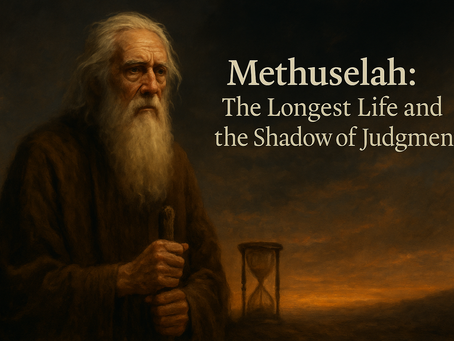top of page


The Daughters of Zelophehad: Bold Petitioners for Inheritance Rights
The Daughters of Zelophehad: Bold Petitioners for Inheritance Rights. Mahlah, Noah, Hoglah, Milcah, and Tirzah—the daughters of Zelophehad—stand out as women of courage and faith. In a patriarchal society, they respectfully appealed for their family’s inheritance and shaped Israel’s property laws.
2 min read


Terah: The Father of Abram and the Unfinished Journey
Terah: The Father of Abram and the Unfinished Journey. Terah occupies a brief but significant place in the biblical story. Though less well known than his son Abram, Terah serves as a bridge between the genealogies of Shem’s descendants after the flood and the beginning of God’s covenant with Abraham. His story is one of beginnings, migrations, and an unfinished journey that ultimately set the stage for God’s great redemptive work.
4 min read


Nimrod: The Mighty Hunter and the Rise of Human Pride
Nimrod: The Mighty Hunter and the Rise of Human Pride. Among the descendants of Noah, one name stands out in Genesis 10 for his unusual description: Nimrod. While most figures in the genealogies are simply listed by name, Nimrod is described with detail, remembered as a mighty hunter and the founder of great cities. His life marks a shift in the biblical story from family lines to nations and empires, representing humanity’s growing strength—and its growing pride.
4 min read


Shem, Ham, and Japheth: The Fathers of Nations
Shem, Ham, and Japheth: The Fathers of Nations. After the flood, humanity began again through Noah’s three sons: Shem, Ham, and Japheth. Their lives represent a new beginning for the world and the foundation of nations that would shape biblical history. These brothers stand as a turning point: the earth had been wiped clean by judgment, and from their families the entire world would be repopulated.
5 min read


The Noahide Laws: Biblical Origin and Christian Context
The Noahide Laws: Biblical Origin and Christian Context. The so-called “Noahide Laws” are often presented as a universal moral code given by God to Noah after the flood. In rabbinic tradition, these became the foundation for ethical behavior expected of all nations, in contrast to the 613 commandments given to Israel through Moses. In modern times, they are sometimes invoked in interfaith dialogue, Jewish teaching, and even political discourse.
3 min read


Noah: The Ark of Salvation and God’s Covenant of Hope
Noah: The Ark of Salvation and God’s Covenant of Hope. Few figures in the Bible stand out as vividly as Noah. His life marks the turning point between the world that was and the world that would be after the flood. In a time of near-universal corruption, Noah found favor with God and became the instrument through which humanity was preserved. His story is one of judgment and mercy, wrath and grace, destruction and salvation. Noah’s life not only reshaped human history but als
4 min read


Lamech: The Father of Noah and the Hope of Relief
Lamech: The Father of Noah and the Hope of Relief. In the midst of the long genealogies of Genesis, one voice stands out with a prophetic word of hope. Lamech, a descendant of Seth, looked at the painful curse of sin and longed for deliverance. When his son was born, he named him Noah, declaring: “May he bring us relief from our work and the painful labor of farming this ground that the Lord has cursed” (Genesis 5:29, NLT).
4 min read


Methuselah: The Longest Life and the Shadow of Judgment
Methuselah: The Longest Life and the Shadow of Judgment. Methuselah stands as one of the most memorable names in the genealogies of Genesis. He is remembered primarily for his extraordinary longevity, living 969 years—the longest lifespan recorded in the Bible. Yet his life is more than a curiosity of ancient history. Methuselah represents both the patience of God in delaying judgment and the reality of death that still reigned over humanity after the fall.
4 min read
bottom of page